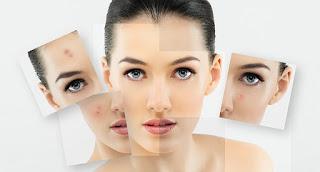Acne is genetic and hormonal factors play a role, but they are also contributing factors called bad habits like diet rich in carbohydrates, excessive consumption of dairy products, smoke and some types of stains that help clog pores. It is possible to control if we follow the recommendations of dermatologists.
According to the group of Dermatologists of the American Academy of Dermatology, we can significantly reduce the problem of mild to moderate acne if we start living a life with good hygiene and dietary habits and increasing our skin care.
The recommendations are simple instructions for us to follow every day and after a few weeks we will see the results. As always, the first advice is to consult your dermatologist so that he will indicate which products are best suited for your skin type and characteristics of acne.
You can start with:
1. Wash your face twice a day and after sweating
Wash your face in the morning (includes daily bathing) and evenings are basic because during the day, the toxins that are in the air adhere to the natural fat of the skin favoring infection.
The same thing happens when we sweat, expel toxins that remain in the epidermis and we must remove them as quickly as possible.
2. Wash your face with special products without the use of sponges
Wash your hands with soap of your choice and then apply a face-preferably recommended that you have your date Dermatology- and gently massage the face with the fingertips, making small circles.
3. Be nice to your face
Take care of your skin and uses only alcohol-free products that are specially formulated for your skin type. We advise you to see a specialist to find out what are the best options for you; for one, do not use astringent and exfoliating lotion if they were not prescribed by a doctor. Remember irritated skin makes acne look worse.
4. Avoid rubbing the skin
Do not use sponges, brushes or any other attachment. Avoid the temptation to abuse the skin unnecessarily irritate because besides, you're helping to spread the infection.
5. Use warm water
Whenever you wash your face, try using warm water and bathe with water not too hot and not stay long under running water.
6. Use shampoo every day
If you have scalp greasy or oily feel, you should wash your hair every day and ask your dermatologist about the best option for you shampoo.
7. Let your skin to heal naturally
Do not take off your blackheads or pimples. Pinch the wounds of acne it is the worst thing you can do, because in addition to spreading the infection will hurt your skin and run the risk of scarring.
8. Avoid touching your face
Regardless of whether you have clean hands, touching your face you are a bad idea because you wear germs from one place to another.
9. Escape the sun and tanning beds
Contrary to popular belief, the sun not only helps reduce acne but also contributes to the formation of marks and scars on the skin. Moreover, many of the drugs prescribed by Dermatologists are contraindicated to sun exposure, so you should ask your physician about using a sunscreen.
10. See a Dermatologist
The best way to treat and prevent acne is following the advice of a medical specialist.
Currently there are treatments that help reduce and eliminate acne. Ask your doctor what kind of care and treatments are right for you.












